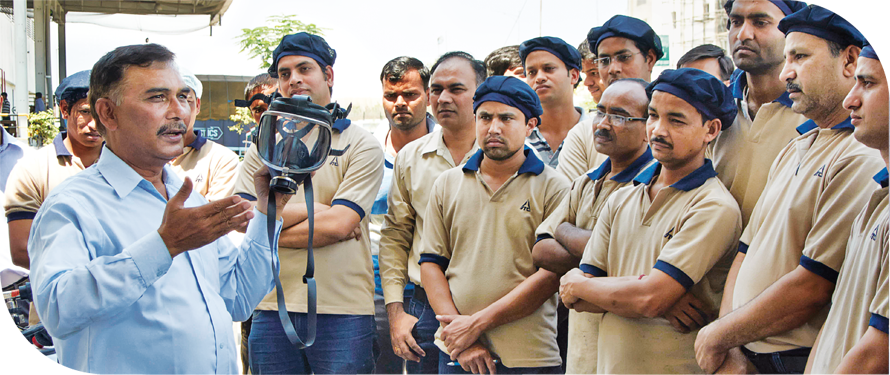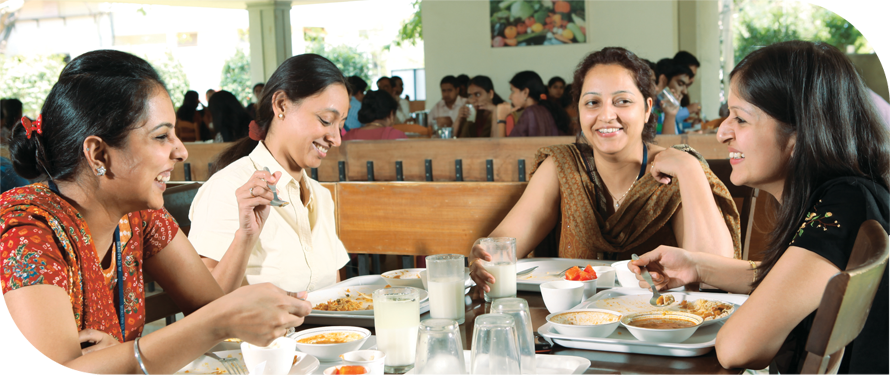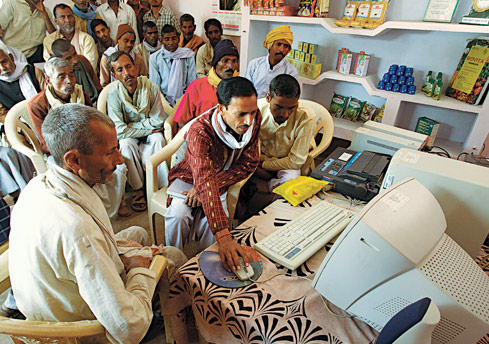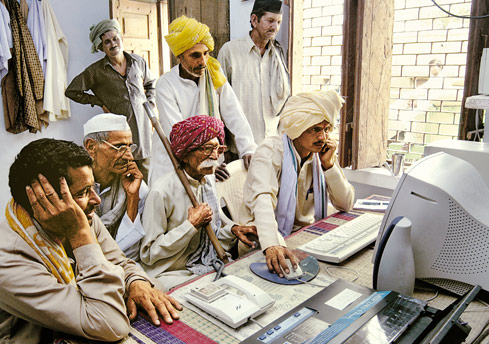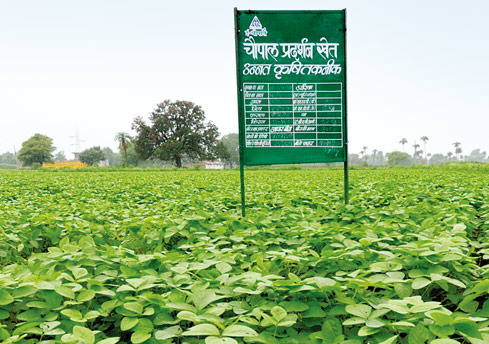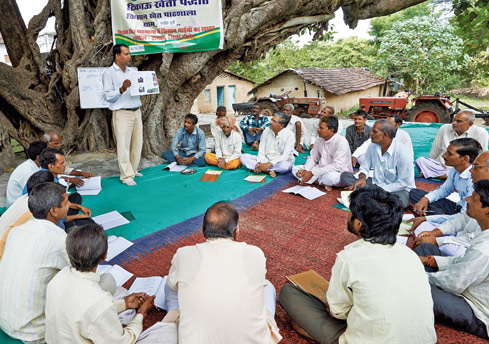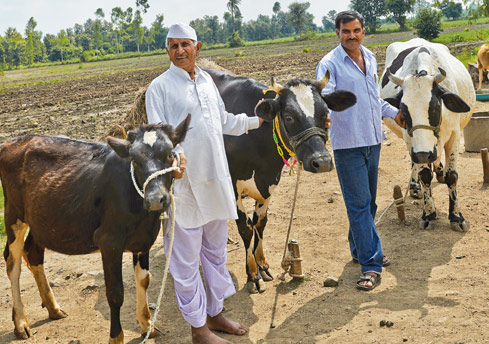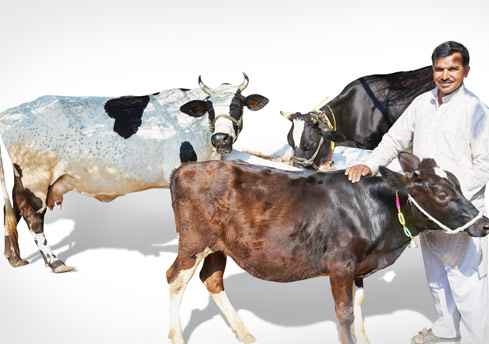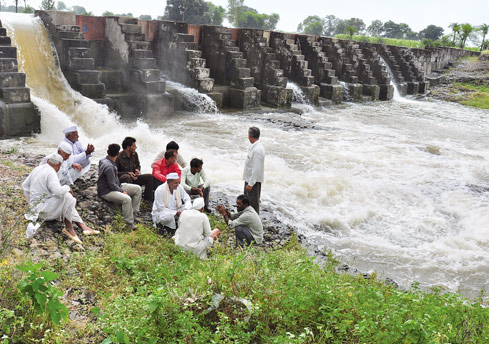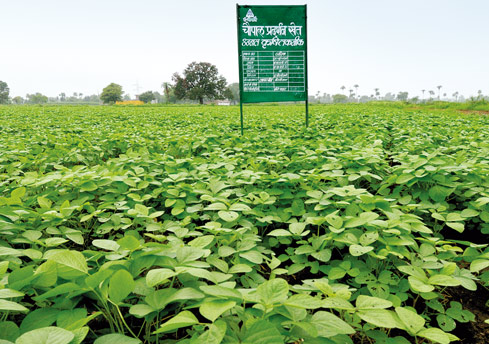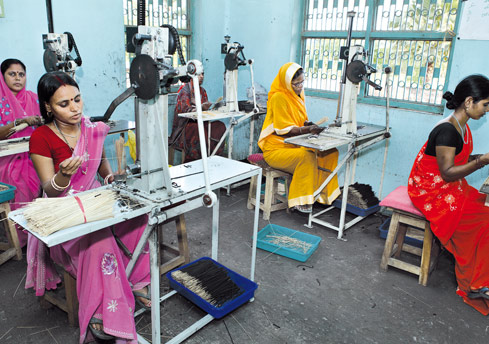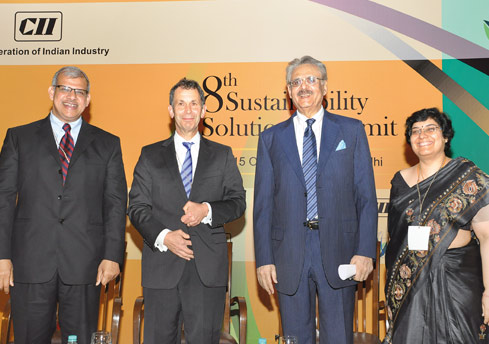ITC Units have appropriate systems and processes in place to ensure compliance with these Policies and with statutory provisions, including processes to redress grievances. The implementation of these policies are ensured by Divisional / SBU Chief Executives, through members of the respective Management Committees. Compliance is regularly monitored and evaluated by the Sustainability Compliance Review Committee (SCRC). The report of the SCRC is reviewed by the Corporate Management Committee every quarter.
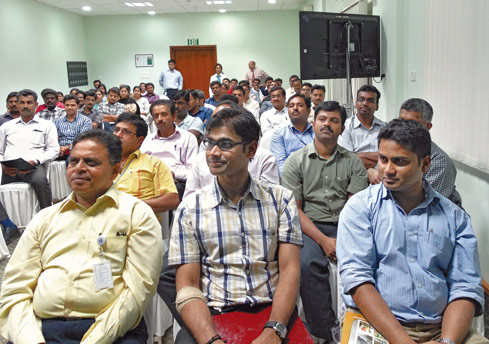

We recruit quality talent from premier campuses across the country through an objective and robust selection process. New employees are assigned to various businesses of the Company and are deployed across the country. Our strategy of organisation is based on the principle of distributed leadership which has ensured that each of our businesses is managed by a team of competent, passionate and inspiring leaders. Our Company's talent and capability building practices have been commended in the Nielsen 2013 Campustrack survey. According to the survey, our organisation has emerged amongst the top five employers of choice in premier management campuses and amongst the top three in premier technology campuses that ITC recruits from.
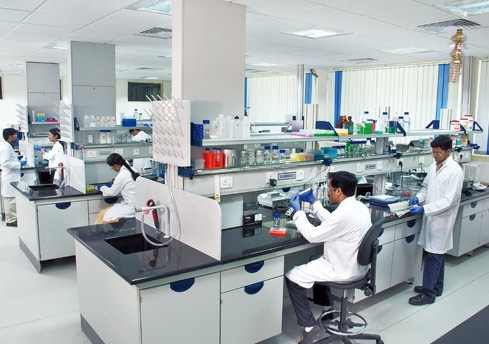
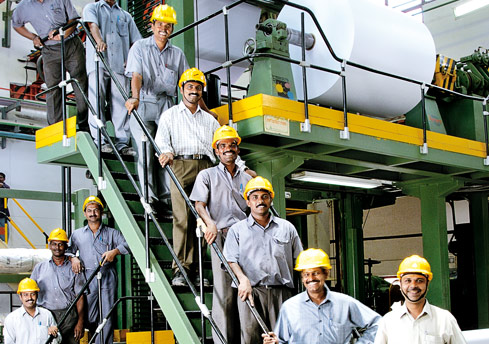
We encourage local employment in our manufacturing units and hotels, depending on the availability of requisite skills. In some of our Units, we also partner with local Industrial Training Institutes to provide vital inputs to the management of these institutions. We have also partnered with agencies that impart vocational training on skills related to sales & distribution, hospitality, construction and technology with an objective of enhancing the employability of youth from disadvantaged sections of society. A large number of youth is also provided with apprentice training opportunities in our manufacturing units.
The different value chains related to our Businesses provide direct and indirect employment to around 6 million people, whose livelihoods are substantially linked to their association with the Company. Indirect employment covers our supply and distribution and agri-sourcing network as well as initiatives under social and farm forestry, e-Choupals, women's empowerment, micro-enterprises and livestock development.
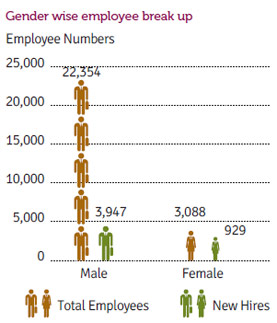 Our human resource management systems and processes aim at creating a responsive, customer-centric and market focused culture that enhances organisational capability
and agility.
Our human resource management systems and processes aim at creating a responsive, customer-centric and market focused culture that enhances organisational capability
and agility.
During 2013-14, our full-time direct employees numbered 30,442 of which 2,202 employees in the Leaf Tobacco business were engaged on a seasonal basis due to the very nature of the business. Of the total number of employees, 3,088 are women. The number of new appointees for the reporting period is 4,876 of which 19% are women.
In addition, 19,629 employees of service providers were engaged during the period. 12,962 of our direct employees are members of various unions. Employees are involved in the implementation of best-in-class technology and process improvements aimed at enhancing productivity and quality. The harmonious relations at all operating Units is a reflection of the Company's approach to employee engagement focusing on a collaborative approach and mutuality of interests. All changes are proposed, discussed and finalised during the Long Term Agreement negotiations. During the year there was one strike resulting in a loss of 3,042 person days of work which is equivalent to 0.02% of the total person days worked.
ITC believes that its competitive capability to build future-ready businesses and create enduring value for stakeholders is enriched by a dedicated and high-quality human resource pool. Therefore, nurturing quality talent and caring for the well-being of employees are an integral part of ITC's work culture. This approach focuses on creating a conducive work environment that helps deliver winning performance. Benefits such as medical assistance (including hospitalisation), group accident insurance scheme, annual leave along with leave encashment and retirement benefits, amongst others, are provided to all permanent and temporary workers. During the year under review, 138 employees applied and were given maternity leave. Of the 138, 95 have returned to work while 37 are still on leave.
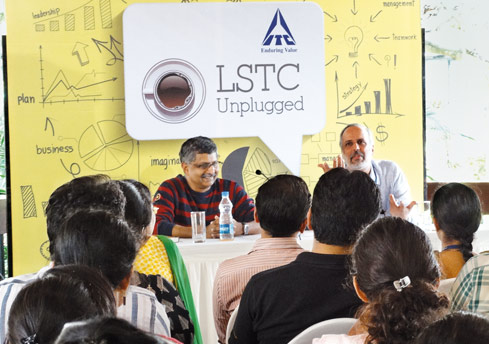
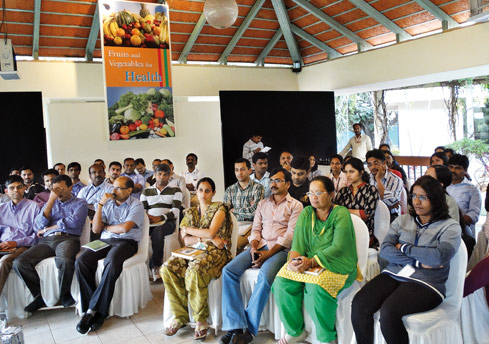
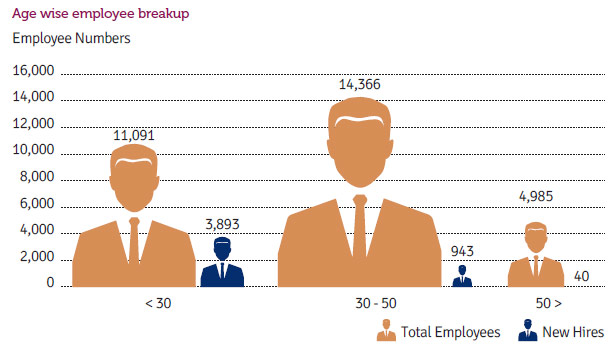
ITC has ensured significant attraction and retention of employees, primarily backed by its robust talent management strategy of offering diverse experiences and challenges across varied business contexts, unparalleled investments towards development and growth of employees, as well as a market driven and competitive remuneration philosophy. The overall attrition (voluntary separation, retirement, termination and abandonment of services) across management and non-management employees for 2013-14 was 14%. The attrition for management level employees was 20% whereas the attrition for non-management workers was 8.6%. The gender wise attrition was at 12.5% and 28.2% for male and female employees respectively.
ITC believes that diversity at the workplace creates an environment conducive to engagement, alignment, innovation and high performance. This is achieved by a policy that ensures diversity and non-discrimination across the Company.
Our approach to human resource is premised on the fundamental belief of fostering meritocracy in the organisation, which promotes diversity and offers equal opportunity to all employees. This ensures that there is no discrimination in compensation, training and employee benefits, based on caste, religion, disability, gender, sexual orientation, race, colour, ancestry, marital status or affiliation with a political, religious or union organisation or majority/minority group.
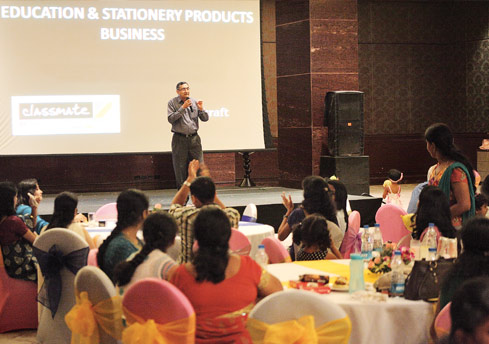
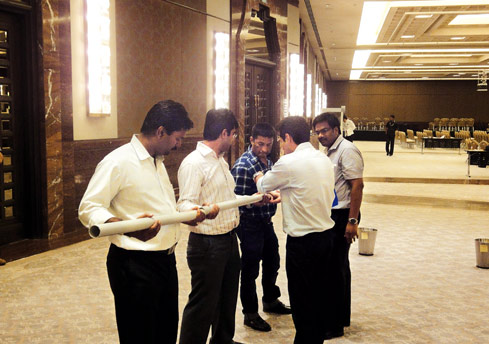
ITC's Capability Development Agenda flows from its Vision, Mission, Strategic Agenda and the 3-Horizon Growth strategy. All Learning and Development initiatives offered during 2013-14 were aligned to this agenda.
ITC has a multi–pronged approach to learning with focussed interventions in core and functional areas, customised business-specific and strategic organisation-wide interventions, as well as three tiered leadership development programmes.
There are multiple forums for learning including classroom training, on-the-job training, inclusion in taskforces and projects, mentoring and deploying of organisation wide portals to enable sharing of best practices.
Employee training at the factory level focusses on continuous skill upgradation on the basis of skill-gap assessment and planned technology induction.
In 2013-14, 1,33,732 person-days of formal training were organised for employees at various levels. In addition, on-the-job learning opportunities were provided to a cross section of employees supported by inputs from peers and superiors.
ITC's Performance Management System also plays a pivotal role in charting out the development agenda of employees in the management cadre. In 2013-14 all eligible managers underwent performance reviews.
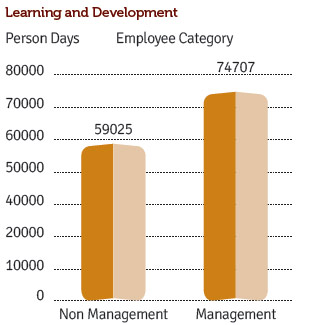
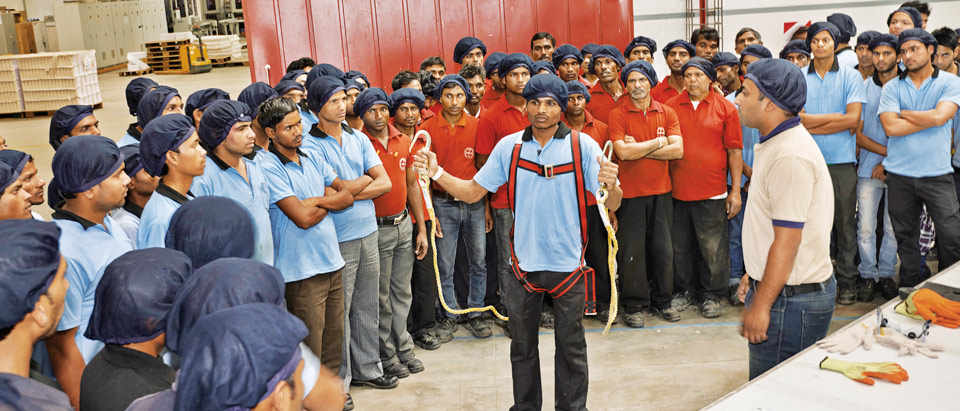
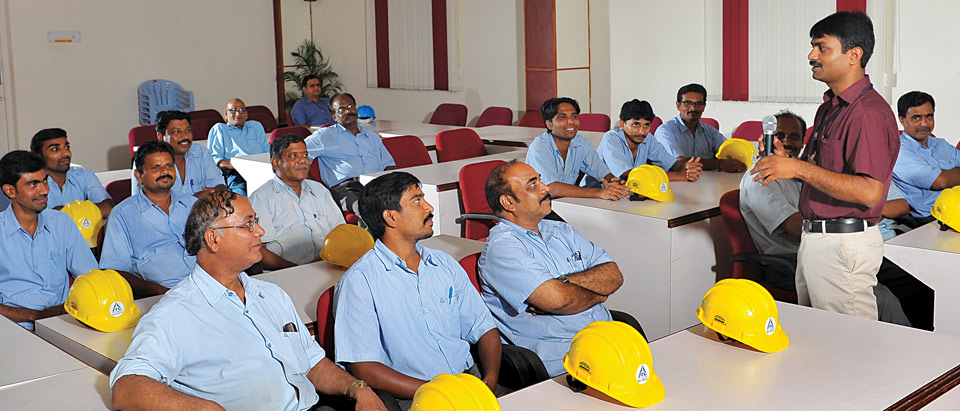
ITC believes that its workforce is a key asset that contributes to the Company's standing as one of India's most valuable corporations. The Company believes that a safe and healthy work environment is a basic requirement for ensuring employee well-being and that best practices in occupational health & safety enhance the Company's overall performance. This helps in the attraction and retention of quality talent and enhances the equity of the Company as a responsible employer.
Management Approach
ITC's approach towards best-in-class occupational health and safety standards is articulated in a Board approved EHS Policy that emphasises continuous improvement and is based on an EHS management system developed in accordance with internationally recognised standards, supported by continued investments towards best-in-class infrastructure and quality human resources.
As a first step, Environment, occupational Health & Safety (EHS) requirements are integrated at the design stage itself for all new investments in the built environment. The design reviews cover building & structural stability, fire & life safety measures, electrical systems, segregation of man-material movements, work place lighting, ventilation & hygiene requirements, noise & dust controls, water and energy use optimisation, etc. The process of incorporating EHS at the design stage not only helps in eliminating/reducing hazards but also optimises the overall infrastructure as well as operational costs.
As a next step, compliance with EHS standards during the construction phase is ensured by implementing appropriate Project EHS management systems. This includes adequate training of all employees including service providers' employees, enforcement of use of safe equipment/tools/tackles, personal protective equipment, development of and adherence to safe work procedures/method statements and observance of good housekeeping and storage practices. Pre-commissioning audits of all large projects are carried out by Corporate EHS (CEHS) to ensure that all equipment and systems have been procured and installed in conformance with agreed standards and a formal clearance provided before making the project operational.
At the operational stage, all our factories, hotels, warehouses and offices have established Environment, Health & Safety (EHS) Management systems. These include designated roles and responsibilities and competent EHS resources to ensure compliance with defined internal EHS Guidelines. As per these guidelines, every Unit is required to have EHS committees to promote active participation of employees and service providers in EHS management. The committees have equal representation from workers and management. These Guidelines also require raising of awareness amongst employees, their families and surrounding communities on off-the-job safety aspects such as home safety, safe use of LPG in the kitchen, HIV/AIDS, hepatitis, dengue, malaria and road safety. As part of our preventive medical programme, various categories of employees, based on their age and exposure to occupational hazards, undergo periodic medical check-ups.
Compliance is verified through internal audits conducted by the CEHS across ITC establishments, on a periodic basis and forms part of the report back to CMC (monthly) and the Board (quarterly), together with accident statistics, their investigation and subsequent closure.
The EHS resources of the Divisions provide necessary support to ensure proper implementation of the ITC EHS policy, while Unit Heads and Divisional Management Committees are responsible and accountable for ensuring compliance. The Corporate EHS function is responsible for reviewing and updating standards and guidelines on EHS policies, providing guidance and support to all concerned and for monitoring compliance at the corporate level.
On-Site Safety Performance
ITC EMPLOYEES
In 2013-14, the number of on-site Lost Time Accidents (LTA) for ITC employees was 10 (against 16 in 2012-13), as illustrated below. Since 2004-05, although the number of Units have increased manifold from 23 in 2004-05 to 47 in 2013-14, the Lost Time Accidents (defined as an accident where the injured person does not return to work in the next scheduled shift) have come down by 73% due to significant efforts made by all Units towards our zero accident goal. Detailed investigation and analysis of accidents helped us better understand the challenges being faced by our Business Units. Besides the strong engineering approach, behaviour-based safety programmes are being institutionalised and behavioural architecture inputs are being used to rework and recalibrate our approach, which are detailed in the subsequent section - 'The Road Ahead'.
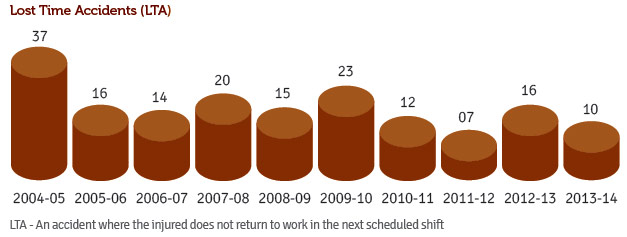
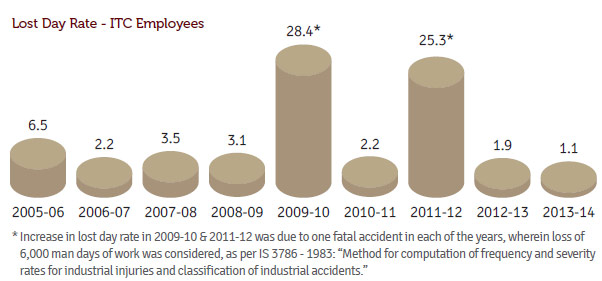
Lost day rate, defined as the number of days lost due to accidents for every 2,00,000 person hours worked, over the years is depicted above. The lost day rate reflects a downward trend since 2005-06, barring 2009-10 and 2011-12, owing to one fatal accident in each of these periods.
Injury rate, defined as the frequency of injuries in relation to total time worked, over the last 10 years showed a significant improvement. Since 2004-05, there has been a reduction of injury rate from 0.21 to 0.03 in 2013-14 (an improvement of 86%).
Employees of Service Providers
All vendors and service providers within ITC premises are required to follow the same systems and procedures detailed under ITC's Corporate EHS Guidelines. All service providers' employees also undergo adequate standard as well as job-specific training for safe work procedures. Regular briefing and tool box talk have been made an integral part of ITC's safety management system, for continuously updating all service providers' employees on safe work procedures.
Since last year, we have also started reporting on the safety performance of our service providers' employees within ITC premises. Though total onsite lost time accidents for service providers' employees for the year was 15 (as against 16 in 2012-13), this is inclusive of 3 very unfortunate on-site fatalities of service providers' employees, out of which two had been in ITC's Paperboards and Specialty Papers Bhadrachalam Unit and one in ITC Gardenia, our hotel at Bengaluru.
Fatal Accidents: Details of the three fatalities that took place within ITC units during 2013-14 are as follows:
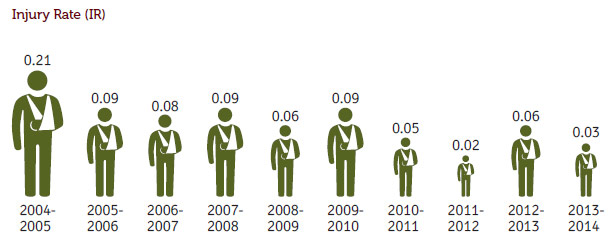
One of the employees of a service provider in ITC's Paperboards and Specialty Papers Unit at Bhadrachalam fell from a height of 3.9 metres while removing waste paper from a working platform and passed away subsequently due to internal brain haemorrhage. In the second case at the same Unit, a truck cleaner while resting in the coal yard area, was run over by a pay-loader and sustained fatal injuries on his head. The third fatal accident was in ITC Gardenia, wherein an employee of a service provider engaged for housekeeping activities, while cleaning a chandelier, lost balance and fell along with the chandelier, resulting in fatal injuries on his head and neck.
All the fatal accidents have been investigated in depth and appropriate interventions have been implemented in the Businesses. These interventions include improving risk management practices, strengthening the behavioural safety initiatives, commissioning specific studies such as a traffic safety management study for ITC's Unit at Bhadrachalam to rationalise traffic management within the premises, as well as initiation of disciplinary action against supervisory staff, as applicable.
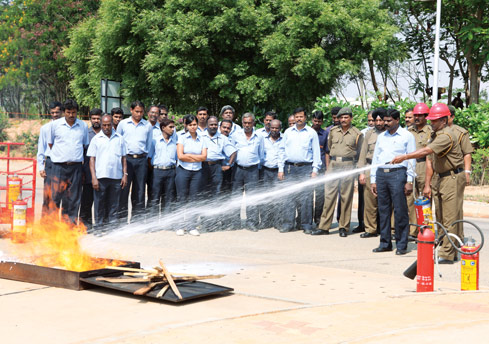

Zero Accident Units
The following Units at ITC attained the goal of 'zero accidents' in 2013-14:
- Cigarette Units at Saharanpur, Kolkata & Pune
- Leaf Threshing Unit at Anaparti
- Packaging & Printing Units at Haridwar & Munger
- Paperboards and Specialty Papers Unit at Bollaram
- Personal Care Products Unit at Manpura
- Life Sciences and Technology Centre, Bengaluru
- Research Centre at Rajahmundry
- ITC Green Centre, Gurgaon
- ITC Infotech Units at Bengaluru and Kolkata
- Trade Marketing and Distribution
- ITC Head Quarters, Kolkata
- Divisional Head Quarters of Cigarettes Business, Agri Business, Leaf Tobacco Business, Paperboards & Specialty Papers Business, Packaging & Printing Business, Foods Business, Personal Care Products Business, Matches & Agarbattis, Education and Stationery Products Business and Lifestyle Retailing Business.
- Hotels: ITC Maurya, ITC Mughal, ITC Grand Central, ITC Rajputana, ITC Maratha, ITC Sonar, ITC Windsor, ITC Grand Chola, My Fortune, Chennai & WelcomHotel Sheraton New Delhi
Over the years, the number of Units delivering "zero on-site lost time accidents" performance has progressively increased and more importantly, have held on to their performance. Out of the above 35 units, 16 Units have been consistently achieving "zero lost time accidents" status for the last 3 years.
Off-Site Safety Performance
In line with our goal to achieve "zero accidents" across our operations, we have started putting in place adequate systems to ensure the safety of our own employees working off-site. In ITC, off-site is defined as places other than on-site while on official duty, including commuting to and from residence to the place of work. In order to identify suitable management interventions, detailed investigation of all off-site accidents over the years has been carried out. These analyses reveal that the majority of off-site accidents have involved 2-wheeler riders. Accordingly, a user-interactive 2-wheeler rider's safety programme was developed and rolled out in 2011-12. Businesses were advised to ensure that all employees using 2-wheelers are trained and that there is a constant reinforcement of the message of exercising extreme care while on the road. Despite this, there has been an increase in the number of road accidents as compared to the previous year, out of which 85% involved employees riding 2-wheelers, which included one very unfortunate off-site fatal accident in which an ITC Executive on a 2-wheeler died in a road accident while on official duty. Though road infrastructure and traffic management outside our premises are well beyond our control, we are providing a special thrust on training and awareness building by translating the interactive ITC 2-wheeler rider's safety programme into local languages to ensure 100% coverage of all employees.
Occupational Health
A healthy workforce is an important contributor to our competitiveness and sustainability. All Units maintain conducive work environments meeting Indian/International standards on hygiene, lighting, ventilation and effective controls on noise and dust.
Units are provided with occupational health centres with adequate medical staff to monitor occupational health and provide immediate relief when required. In addition, at least 2% of our employees are professionally trained as first aiders.
Identified medical examinations are conducted for various categories of employees based on age-groups as well as exposure to occupational hazards. These medical examinations take place annually/ once in 3/5 years as applicable.
Accordingly in 2013-14, 14,874 employees underwent preventive medical examinations and there were no occupation related illnesses identified in any of our business Units.
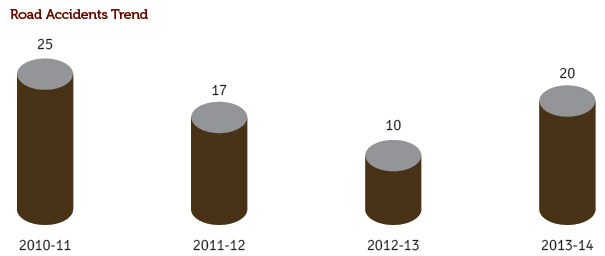
HIV/AIDS and other Serious Diseases
We have remained committed to do our best in response to the threat posed by various serious diseases including HIV/AIDS. During 2013-14, awareness/ counselling sessions were conducted for the employees and communities around our Units covering a total of 16,665 people, out of which 11,330 were our employees while the remaining were local community members.
The Road Ahead
Based on the root-cause analysis of accidents over the years, the approach to safety has been redefined. The focus now is on fostering a culture of safety and use of behavioural architecture techniques. This is being enabled by the creation of an organisation-wide culture of safety, involving individual ownership and integration with business processes, which also support a "One Unit-One team" approach. Such a shared ownership not only ensures accountability but also provides the opportunity for optimisation in safety hardware costs. Our safety management system is being evolved to ensure that training and other communications are relevant and that they factor in the local socio-economic context thus confirming the transition from "awareness developed" to "changed behaviour".
While we continue to focus on strengthening engineering control measures through 'design for safety', pre-commissioning/ operational audits and training interventions, behaviour-based safety programmes, initiated in two of ITC's Units, will also be extended to other Units in the coming years. It is also of paramount importance that safety as a value system is inculcated among new recruits in the organisation through meaningful and impactful communication. A corporate safety induction training programme based on this concept has been developed using cognitive neuroscience and behavioural economics inputs. Based on the success of this programme, more such interventions will be planned at Unit/Divisional levels. This approach, which combines empowerment and ownership with targeted interventions and stringent accountability, should help us in our journey towards achieving the "Zero Accidents" goal.
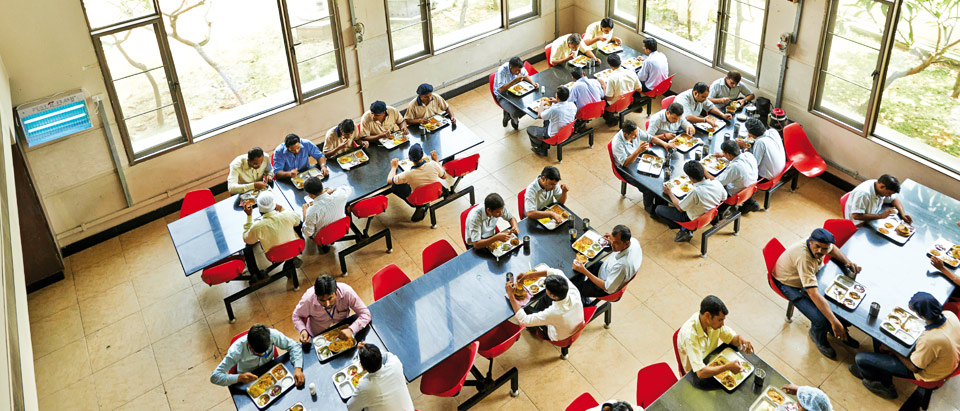
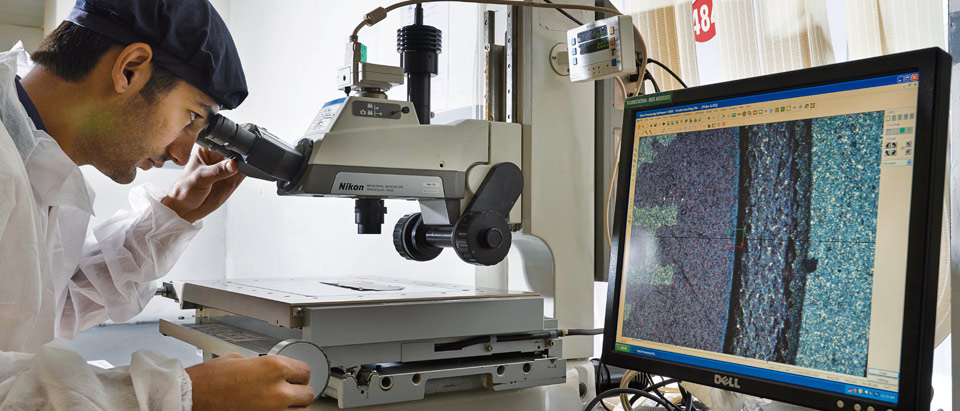
During 2013-14, nearly Rs.1,632 crores out of total capex cash flow of Rs.2,661 crores was incurred on machinery and technology, sourced from reputed global suppliers/vendors. Approximately Rs.692 crores were invested on new factories, hotels and modernisations.
All large contracts in ITC, for the construction of hotels, factories, and significant upgrades, have incorporated environment, health, safety and human rights clauses covering decent place of work, and beyond compliance labour practices.
All large projects were managed and supervised by ITC managers, who also ensured compliance to relevant laws.
Systems have been established to ensure compliance of our Policies and Standards, through rigorous audits by Corporate Internal Audit and Corporate EHS.
Human Rights: Supply Chain
As a large multi-business Enterprise with products that are benchmarked nationally and internationally, we recognise our responsibility to proactively encourage high standards of 'Human Rights' across our Supply Chain. Our approach to managing Human Rights in the following distinct categories is described below:
- Our Businesses are vertically integrated across several Divisions, all of which ensure adherence to ITC Human Rights policies.
- We procure inputs for the Company's agri-based businesses entirely from state controlled trading platforms and the open market. The Process is designed to ensure transparency and best prices for even small and marginal farmers.
- ITC ensures the adherence to its Policy on Human Rights, Labour Practices and decent Work Environment for all its employees and for all Service Providers operating within its Establishments. ITC has zero tolerance for non-compliance in this area.
During 2013-14, the total number of Service Providers was 2,574 of which 1,646 operated within the Company's premises and 928 worked off-site. All on-site contracts include important clauses on Environment, Health and Safety.
No contracts were cancelled during the year as a result of non-compliance with ITC's Human Rights Policy.
Freedom of Association
During 2013-14, no incidents of violation of Freedom of Association were reported either to the concerned units or statutory authorities. Within ITC's operations, there are no areas with risks to the right to exercise Freedom of Association and Collective Bargaining.
Prohibiting Child Labour and Preventing Forced Labour at Workplace
During 2013-14, there were no incidents of child labour or forced labour within ITC establishments. In the subsequent year, we will initiate the process of strengthening Systems to educate, mandate and thereafter track adherence to ITC's Policy on Human Rights in the Supply Chain. This Process should be well established over the next five years.
Diversity and Equal Opportunity
In line with the Company's Policy on Diversity and Equal Opportunity (Please refer to Policies on ITC's Corporate website - www.itcportal.com) and given the socio-cultural diversity of our country, ITC's recruitment and selection processes are geared towards enabling representation from across regions, ethnicities, religions and different social strata.
The culture of the Company ensures that aspects of work-life balance for employees, especially for women, are suitably addressed. The Company has put in place suitable processes and mechanisms to ensure issues such as sexual harassment, if any, are effectively addressed. During the year, three complaints of sexual harassment were received, of which two have since been resolved. ITC demands, demonstrates and promotes professional behaviour and treats all employees with equal respect.
ITC believes that it is necessary to represent to and engage with authorities on matters concerning the various sectors in which it operates. The Board approved Policy on Responsible Advocacy provides the framework for the necessary interface with Government/Regulatory Authorities. ITC works with apex industry institutions that are engaged in policy advocacy, like the Confederation of Indian Industry, Federation of Indian Chambers of Commerce and Industry, Associated Chambers of Commerce and Industry of India and various other forums including regional Chambers of Commerce. ITC's engagement with the relevant authorities is guided by the values of commitment, integrity, transparency and the need to balance interests of diverse stakeholders.
The Company, for its social development projects, organises meetings with the local administration and state governments to seek their participation and involvement. Their expert advice and counsel are also sought and approvals obtained, where required, for the planned interventions. The Company also engages in public-private-partnerships (PPP) with the state governments for such projects.
The CII-ITC Centre of Excellence for Sustainable Development also interacts with the Government and policy makers to promote sustainable development and inclusive growth through corporate action.
Management Approach
ITC e-Choupal
Wasteland Development through Social Forestry
Soil & Moisture Conservation Programmes
Livestock Development Initiatives
Building skills and social infrastructure through:
Primary Education, Health & Sanitation
Women's Empowerment & Gender Equality
ITC believes that the performance of business enterprises must be measured in terms of the value they create for society. Enterprises that embed sustainability into their strategies can create substantial stakeholder value through innovative development models that simultaneously generate sustainable livelihood opportunities as well as create a positive environmental footprint. The Company firmly believes that such an approach unleashes strong drivers for achieving development with social equity.
Commitment to creating larger societal value
As part of its Triple Bottom Line commitment, ITC is committed to make growth more inclusive by focusing on the needs of two identified stakeholders:
- The rural communities engaged in agriculture, from whom ITC procures a substantial share of raw materials. Almost all these crops are grown under rain-fed conditions in some of the most moisture stressed regions of the country. Given the critical reliance of several of our businesses on agri-supply chains, it is in the Company's interest to enable rural farmers to strengthen their production system and enhance yields on a sustainable basis.
- The communities residing in close proximity of ITC's production units, so as to enable them improve their standard of living. ITC's inclusive models enable these neighbouring communities to live a life of social and economic dignity, thus responding meaningfully to their needs and aspirations.
Constructive Stakeholder Engagement
The overarching aim of the Company's social sector engagement is to empower stakeholder communities to conserve, augment and manage their social and environmental capital in order to promote sustainable livelihoods or employability on a significant scale. Within this, the two specific objectives, pertaining to the two sets of stakeholders, are:
- Promotion of climate-smart rural development by broad-basing the farm and off-farm livelihoods portfolio of the poor and marginalised. Such interventions strengthen the existing productive base as well as provide alternate sources of incomes, which helps minimise the dependence of farmers on rain-fed crops for economic survival.
- Nurture and develop social capital to create a more level playing field for skill-related modern production and to meet the competitive demands for higher productivity. Both, in turn, generate higher incomes and help in alleviating poverty.
Striding a wider canvas in the interest of the nation, ITC is committed to pursuing excellence in sustainability and preserving India's unique cultural heritage.
The Board has approved a CSR Policy that covers the programmes, projects and activities that the Company plans to undertake. These programmes fall within the purview of Schedule VII of the provisions of Section 135 of the Companies Act, 2013 and the Companies (Corporate Social Responsibility Policy) Rules, 2014.
Implementation
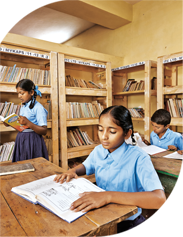 The Board CSR Committee tables for the Board's approval, a CSR Plan outlining the CSR Programmes to be carried out during the financial year and the specified budgets therein. The Board deliberates and approves the CSR Plan with modifications that may be deemed necessary. The Company's Corporate Management Committee (CMC) reviews the implementation of the CSR Programmes and issues necessary directions from time to time to ensure orderly and efficient execution of CSR Programmes in accordance with this Policy. In addition, the CMC provides a status update to the CSR and Sustainability Committee on the progress in implementation of the approved CSR Programmes. The CSR and Sustainability Committee reviews such reports and keeps the Board apprised of the implementation status of the same.
The Board CSR Committee tables for the Board's approval, a CSR Plan outlining the CSR Programmes to be carried out during the financial year and the specified budgets therein. The Board deliberates and approves the CSR Plan with modifications that may be deemed necessary. The Company's Corporate Management Committee (CMC) reviews the implementation of the CSR Programmes and issues necessary directions from time to time to ensure orderly and efficient execution of CSR Programmes in accordance with this Policy. In addition, the CMC provides a status update to the CSR and Sustainability Committee on the progress in implementation of the approved CSR Programmes. The CSR and Sustainability Committee reviews such reports and keeps the Board apprised of the implementation status of the same.
Outcomes
Innovative interventions have been designed and implemented that:
- Create sustainable livelihoods for some of the most disadvantaged sections of the society.
- Nurture the environment by promoting sustainability practices through industry associations.
- Preserve and promote Indian heritage and culture.
Recognising that business enterprises are economic organs of society and draw on societal resources, it is ITC's belief that a company's performance must be measured by its Triple Bottom Line contribution to building economic, social and environmental capital towards enhancing societal sustainability. ITC believes that in the strategic context of business, enterprises possess, beyond mere financial resources, the transformational capacity to create game-changing development models by unleashing their power of entrepreneurial vitality, innovation and creativity. In line with this belief, ITC continues to craft unique models to generate livelihoods and environmental capital. Such Corporate Social Responsibility ("CSR") projects are far more replicable, scalable and sustainable, with a significant multiplier impact on sustainable livelihood creation and environmental replenishment.
| Key Stakeholders | Objectives | Strategic Interventions | Desired Outcomes |
| Rural households aligned to ITC's agri-businesses | Biomass cover of 33% of project areas Progress towards 'safe groundwater zone' status Achieve 0.75-1% soil organic carbon 50% of village GDP from dairy activities | Natural Resource Management, Integrated Animal Husbandry, Sustainable Agriculture | Sustainable & accelerated growth in livelihoods and farm incomes |
| Communities residing around ITC's factories | Poor women to have access to credit or supplementary income Every child in school and learning well Appropriate skills for all unemployed youth No open defecation | Sustainable Livelihoods Creation, Social Infrastructure, Skilling | Dignity of life through economic & social empowerment |
| State & Central Governments | Innovate and pilot development models of excellence for replication, scale and efficient execution | Initiatives promoting national goals of poverty alleviation and environmental protection | Multistakeholder partnership to maximise development impact |
In line with ITC's CSR Policy, the key stakeholders and the thrust areas of its CSR programmes comprise:
- The rural communities with whom ITC's agri-businesses have forged long and enduring partnerships through their crop development and procurement activities. The majority of these communities are located in drought-prone regions and therefore most vulnerable to the adverse impacts of seasonality and environmental degradation. Almost entirely dependent on common property resources, they are among the most disadvantaged sections of rural communities.
- The communities residing in close proximity of our production units, whose full potential cannot be realised due to poor social infrastructure in the areas of education, skill enhancement, health and sanitation.
- The Central Government and State Governments, with which we partner to roll out and scale up innovative projects piloted to create replicable models of development.
ITC e-Choupal
Recognising the various challenges faced by the farmer, the ITC e-Choupal was designed to provide a 360-degree intervention to trigger a virtuous cycle of higher farm productivity, higher income, enlarged capacity for farmer risk management, and thereby larger investments to enable higher quality and productivity.
The first level of the e-Choupal system consists of a network of village internet kiosks that enables even small and marginal farmers in rural India who are delinked from the formal market to access real time information on weather, market prices, relevant knowledge and quality inputs to enhance farm productivity and quality and command better prices, thus making them more competitive in the national and global markets. The kiosks are managed by farmers themselves and one selected farmer called the sanchalak is trained to help his community access ready information in their local language. At the next level of the e-Choupal system are the Choupal Saagars, which are procurement-cum-retail hubs located within tractorable distance of 25-30 kms. The e-Choupal network also provides customised extension services, knowhow on best farming practices, quality agri-inputs like seeds, herbicides, fertilisers and pesticides through a single channel.
By providing knowhow and connecting farmers to markets, the e-Choupal network has enabled a virtual integration of the supply chain and eliminated wasteful intermediation and multiple handling, which led to significant reduction in transaction costs apart from expanding markets and enhancing rural incomes.
The e-Choupal initiative today covers 40,000 villages benefitting 4 million farmers. As a result of these interventions, ITC e-Choupal initiative has enabled farmers to raise productivity levels and incomes through capacity building, technology transfer including knowhow, building market linkages and value chain integration. There is visible development in the e-Choupal villages with rising purchasing power, as well as infrastructure development arising out of increased economic activity. Efficient market signals have also led to crop quality improvement, aligning it with consumer preferences.
The e-Choupal is an important component of ITC's multi-dimensional Integrated Rural Development Programme that had evolved from its deep understanding of the challenges and opportunities inherent in the farm sector. The strategy of this intervention which is aimed at empowering farmers and raising rural incomes is broadly centred around four distinct dimensions, which together enable a comprehensive development of the rural ecosystem. These dimensions are in the areas of (a) information and knowledge dissemination. (b) Access to quality inputs and markets. (c) Generating supplementary incomes and (d) Natural resource augmentation. Farmers are provided with critical information and relevant knowledge on farm productivity, prices and markets through the ITC e-Choupal. This platform also enables access to quality inputs for better productivity besides expanding the reach to markets. Initiatives such as Livestock Development and Women Empowerment create avenues for supplementary non-farm incomes to protect against agri-income volatility as well as build capacities for investment. Watershed Development as well as Afforestation Programmes augment natural resources to enable higher productivity, create a green cover and restore soil health.
Taken together, the ITC-Choupal programmes have had a transformational impact in many areas of rural India.
ITC'S SOCIAL INVESTMENT PROGRAMMES
ITC has put in place a mutually reinforcing CSR Programme_christened Mission Sunehra Kal (MSK) _ which has been designed to liberate even the most underprivileged and marginalised among these stakeholder groups, from the shackles of poverty and underdevelopment through economic empowerment based on grassroots capacity building. ITC is ideally positioned to respond to these challenges, given its core objective of empowering its stakeholder communities to promote sustainable livelihoods, which, in turn, is strategically aligned to the national goals of poverty eradication and environmental regeneration.
Rural Households - Climate Smart Agriculture
Already water-stressed and facing widespread environmental degradation, approximately two-third of the country's population is rural and dependent on agriculture and allied activities for their livelihoods. The overwhelming majority are small/marginal farmers whose only option is rain-fed agriculture. With a direct and symbiotic dependence on climate sensitive sectors, they naturally have low adaptive capacities. Stagnating productivity is exacerbated by the fragile natural resource base, fragmented land-holdings, unscientific land management practices, overuse of chemical fertilisers, falling incomes and, increasingly, by the growing effects of climate change. Dwindling bio-mass has created pressure on fodder and energy needs for these households. Livelihood security is further constrained by limited off-farm employment options, poor infrastructure and inadequate marketing channels. These factors all combine to perpetuate a cycle of endemic poverty.
Given the geographical diversity of its stakeholder communities, ITC's main challenge is to develop models that could be replicated across locations with the flexibility to be tailored to individual community needs. These twin concerns are addressed by a faithful adherence to four fundamental tenets:
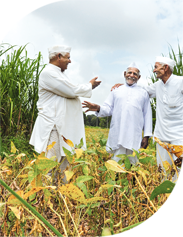 Enhance the ecological resource base of the rural economy by strengthening community-based governance of natural resources that protects, preserves, nurtures and expands such resources;
Enhance the ecological resource base of the rural economy by strengthening community-based governance of natural resources that protects, preserves, nurtures and expands such resources; - Employ a bottom-up participatory approach that ensures an in-built flexibility to address diverse needs _ aiming to create empowered village institutions and enable communities to co-operatively conserve and manage their resources;
- Encourage collaborative processes and multi-stakeholder partnerships to enable identification of the best strategies to address community needs and expand the development footprint of each project;
- Put in place end-to-end solutions that address the spectrum of needs of these communities instead of focusing solely on a single issue.
COVERAGE
The projects promoted under the CSR programme increased from 107 in 2012-13 to 110 during the reporting period. These projects are spread across 13 states covering 61 districts. The interventions reach out to more than 6.40 lakh households in more than 9,100 villages. Of the total projects currently being implemented, 83% are designed for rural stakeholder households, while the balance 17% addresses stakeholders residing around our factories. The CSR programme is spread across the states of Andhra Pradesh, Assam, Bihar, Himachal Pradesh, Karnataka, Madhya Pradesh, Maharashtra, Odisha, Rajasthan, Tamil Nadu, Uttarakhand, Uttar Pradesh and West Bengal.
Animal Husbandry and Dairy Development
ITC's Livestock Development programme promotes animal husbandry as a viable livelihood option by leveraging the fact that the majority of rural households own cattle. It is estimated that animal husbandry contributes 30-50% of rural household incomes, but livestock quality is poor and milk yields abysmal. ITC provides doorstep artificial insemination (AI) services to produce cross-bred progeny with yields that are significantly higher, converting a low-yielding asset into a profitable new livelihood opportunity. A comprehensive package of services, covering AI and all aspects of cattle health, is provided through Cattle Development Centres (CDCs) which are manned by local youth trained as technicians.
Commencing in 2003-04, there are currently 261 CDCs, spread across 7 states. 3.98 lakh cross-bred progeny have been born to date and animal husbandry services were provided to over 10 lakh breedable cattle.
The Company's CSR initiatives aimed at enhancing milk production, increasing dairy farm productivity and ensuring remunerative prices to farmers in multiple locations continued to make good progress during the year. A unique cashless milk payment system which enables direct electronic payment into farmers' bank accounts, together with a comprehensive package of extension services such as veterinary care, breeding, supply of balanced cattle feed and feed supplements, fodder propagation and training of dairy farmers has been initiated. In Munger (Bihar), the milk procurement network has increased to 194 Milk Producer Groups (MPGs) with over 4,500 members. The average daily procurement in Munger was 13,729 lpd with a peak of 35,441 lpd. Extension services were also promoted in 28 villages in Nanauta and Gangoh blocks of Saharanpur (UP). Baseline surveys to determine the status of the livestock economy in Pune district (Maharashtra) was completed during the year.
| Activity | 2012-13 | 2013-14 | Cum to 2013-14 |
| CDC Centres (No) | 10 | (42) | 261 |
| Breed Improvement | |||
| No of AIs (Lakhs) | 2.75 | 2.55 | 13.37 |
| No of Pregnancies (Lakhs) | 1.30 | 1.40 | 6.24 |
| No of Calfing (Lakhs) | 0.89 | 0.91 | 3.98 |
| Vaccination & Health (Lakhs) | 0.72 | 0.14 | 5.03 |

Social Forestry
PROGRAMME DESIGN
The Social Forestry programme is specifically targeted towards small-holders (in particular Scheduled Tribes and Scheduled Castes). Marginalised, both economically and socially with landholdings generally less than 1 hectare, they are not considered credit worthy by formal lenders and are compelled to work as daily wage earners or indebted labour. They are often forced to resort to seasonal out-migration to earn their livelihood. These households are mobilised to form Wood Producers Associations (WPAs) through which ITC provides long-term interest-free loans and a package of extension services – silvicultural training, land development, financial management, plantation and documentation maintenance.
Members are mandated to repay their loans (single payment or in instalments) to the association after the first harvest to build a corpus for the Village Development Fund (VDF), which is used to extend loans for further plantations, for emergencies and to invest in community assets. During the gestation period, lops and tops help to meet household fuel requirements while intercropping is encouraged to provide a source of income and nutrition.
PERFORMANCE
Commencing in 2001-02, the programme has cumulatively greened nearly 45,000 hectares in Andhra Pradesh and 2,600 hectares in Karnataka. Plantation activities like land development, planting, felling, debarking, etc. generate employment, especially for the landless. To date, both the Farm and Social Forestry programmes have generated over 73 million person-days of employment. A total of 1,058 village WPAs have a collective VDF of Rs.1.14 crores.
 The highlights of this year included: (a) the incorporation of bio-diversity conservation as an integral part of the Social Forestry programme, which aims for in-situ conservation of the local flora by protecting and improving production conditions in the selected plots; and (b) Expansion in the coverage of agro-forestry, aimed at food and wood security; 3,848 hectares were brought under agro-forestry, an eight-fold increase compared to the previous year. The most common intercrops grown comprised cotton, pulses, vegetables and chilli.
The highlights of this year included: (a) the incorporation of bio-diversity conservation as an integral part of the Social Forestry programme, which aims for in-situ conservation of the local flora by protecting and improving production conditions in the selected plots; and (b) Expansion in the coverage of agro-forestry, aimed at food and wood security; 3,848 hectares were brought under agro-forestry, an eight-fold increase compared to the previous year. The most common intercrops grown comprised cotton, pulses, vegetables and chilli.
The total area harvested by the end of the year (1,623 hectares) was more than double that of the previous year as was the total harvest (61,000 tonnes) generating a total wealth of nearly ` 30 crores for poor and marginal farmers. This resulted in an appreciable increase in the earnings per hectare and per household, sufficient to pull poor households out of a low income/debt trap. Plantation incomes represent earnings from a previously unproductive asset, which has gained value as the tangible economic benefits of the programme have escalated land prices and lease rates.
| Activity | 2012-13 | 2013-14 |
| Harvest | ||
| Area (Hectares) | 756 | 1,623 |
| Farmers (No) | 813 | 2,321 |
| Volume Harvested (Tonnes) | 28,137 | 60,519 |
| Total Income (Rs. Lakh) | 773 | 2,949 |
| Repayment to Committee/ NGO | 6 | 20 |
| Earnings/ Household | 95,067 | 127,067 |
| Earnings/ Hectare | 102,247 | 181,724 |
| Activity | 2012-13 | 2013-14 | Cum to 2013-14 |
| Coverage | |||
| No of new villages | 396 | 719 | 2,436 |
| No of new beneficiaries | 10,102 | 12,827 | 52,670 |
| Plantation Area | |||
| Andhra Pradesh (Hectares) | 773 | 2,949 | 44,605 |
| Karnataka (Hectares) | 6 | 20 | 2,577 |
| Saplings Planted (Lakhs) | 95,067 | 127,067 | 2,936 |
| Agro-forestry Area (Hectares) | 102,247 | 181,724 | 4,670 |
IMPACT
An impact assessment survey was conducted in November–December 2012 by iKOnet Research & Consultants covering 1,648 beneficiaries in 62 sample villages in the Khammam District. Some of the significant findings of the study are as follows:
- Change in Land-use pattern: The Social Forestry (SF) Plantations were found to cover large tracts of uplands and fallow lands which are generally under no productive use. The plantations thus emerged as a superior land-use option against other agricultural crops for such lands. As a result, SF plantations have emerged as the second most important crop in the region after foodgrains.
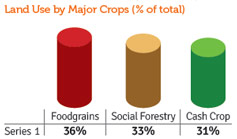
- Share of Total Income by Source: The study found that earnings from SF were a significant addition to the total income of the beneficiaries, amounting to Rs 7,000/- annually, which was found to be 11% of the total annual income of the households. More importantly, the increase in income from various sources post introduction of the project was the highest for SF plantations. It accounted for nearly half of the increase in total household incomes, significantly higher than even agricultural crops.
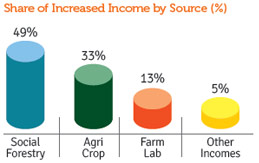
- Asset ownership changes: The most noticeable impact has been on asset creation as a result of the lump sum earnings every 4 years from the plantations. More than half the households have invested in better and safer housing (pucca homes or cement floors). Expenditure on household durables like TV, mobile phones and even air coolers has increased with 60% of the respondents attesting to the presence of one or all of the above in their households after earnings from the SF programmes. A significant section of the beneficiaries purchased bicycles and motorbikes. Expenditure on agriculture also increased, especially in investments on tractors, irrigation facilities and livestock.
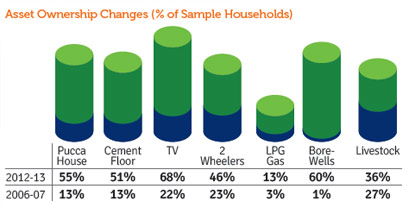
Soil and Moisture Conservation
PROGRAMME DESIGN
ITC's Integrated Watershed Development programme targets the most disadvantaged sections of the community _ small and marginal farmers who are almost entirely dependent on common property resources, including water. Extensive Participatory Rural Appraisal (PRA) exercises identify target beneficiaries who are constituted into Water User Groups (WUGs), with priority on the adequate representation of women. PRAs also lead to the formation of village micro-plans that identify optimal watershed initiatives and detailed planned interventions including locations, responsibilities for implementation at various levels and the financial outlay involved. Though ITC is the major source of funding, community contributions range from 20-75%, depending on their socio-economic conditions. Local contribution helps generate a high level of ownership, which leads to more efficient conservation and use of resources.
WUGs undergo intensive training in watershed management techniques, structure maintenance, water use regulation and formulation of user charges. They plan, implement and monitor all activities including the building of micro-water harvesting structures (check dams, village ponds, percolation tanks, etc.) adopting suitable water saving technologies and soil and moisture conservation measures (contour bunds, loose boulder contours, gully plugs, etc.), and eco-restoration through revegetating common lands. Community wisdom and local knowledge is an important input in planning, e.g. the type of structure, biomass needs, etc. The emphasis is on using traditional methods in conjunction with modern techniques to build location-specific, low-cost structures, relying on local materials and simple technology. Water user charges go towards creating a corpus used to maintain the structures _ a key factor in the long-term sustainability of the projects.
| Activity | 2012-13 | 2013-14 | Cum to 2013-14 |
| Water Harvesting | |||
| Minor Structures (No) | 236 | 533 | 2,976 |
| Major Structures (No) | 234 | 300 | 1,998 |
| Total Structures (No) | 470 | 833 | 4,974 |
| Watershed Area | |||
| Area Treated (Hectares) | 21,261 | 2,949 | 98,325 |
| Critical Irrigation Area (Hectares) | 5,375 | 20 | 50,465 |
| Total Watershed Area (Hectares) | 26,636 | 32,662 | 148,789 |
| Direct Beneficiaries (No) | 19,271 | 19,426 | 127,394 |
| EMPL Mandays (Lakhs) | 9.21 | 4.94 | 40,18 |
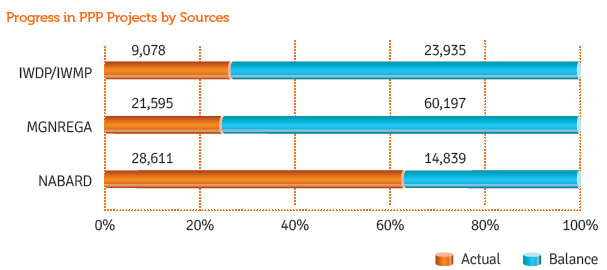
PERFORMANCE
Commencing in 2000-01, the programme is currently spread across 1,027 villages in 7 states. 1,234 WUGs have built 4,974 water harvesting structures and accumulated a Maintenance Fund of ` 79 lakhs. The total area brought under soil & moisture conservation is 1.49 lakh hectares, including provision of critical irrigation to 50,465 hectares, benefiting 1.27 lakh households. By extending critical irrigation and improving water availability throughout the year, the programme has enabled these farmers to increase yields (by an average of 20%) and return to multi-cropping across the majority of the programme area. To date, the programme has created 4 million person-days of employment through construction activities and the rise in agricultural productivity.
Three new MOUs were signed with the Government of Maharashtra (for Satara district) and the Government of Madhya Pradesh (for Sehore district) to implement the government's Integrated Watershed Management Programme. With this, the total area to be brought under soil and moisture conservation through PPP projects has increased to over 1.58 lakh hectares.
By the end of the financial year, 66% of the total target area under the NABARD projects had been completed in the states of Madhya Pradesh, Andhra Pradesh, Maharashtra, Rajasthan and Bihar. 27% of the target had been met in the collaboration with State Governments of Madhya Pradesh, Maharashtra and Rajasthan.
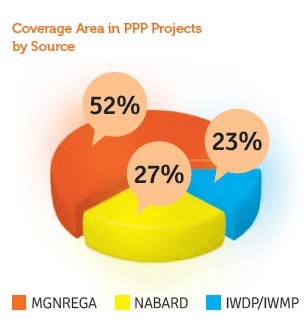
| Partner | Area (Hectares) |
| NABARD | 43,450 |
| Rajasthan Government | 43,117 |
| Madhya Pradesh Government | 23,944 |
| Maharashtra Government | 47,744 |
| Grand Total | 158,255 |
IMPACT
- Household Incomes: The watershed development programme in Yavatmal district (Maharashtra) was implemented during 2007-12. The impact study of the project, carried out by Access Livelihoods Consulting, revealed that income as a result of the watershed interventions increased by nearly 50% for both agriculturalists and farm labourers.
Changes in Household Incomes
Before Intervention After Intervention % change Agricultural Income 37,981 58,036 53% Daily Wage Income 21,126 31,566 49% - Groundwater Recharge: The same study for the Yavatmal watershed project also showed the change in groundwater status as a result of the watershed interventions. The well survey data of the study shows that increase in the water column was observed for all seasons, with a significant increase observed even in the winter months. The very fact that water is available in the summer months clearly demonstrates that the project was successful in ensuring recharge.
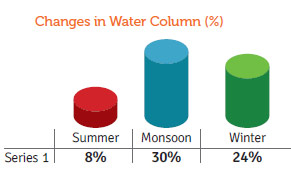
- Irrigation Costs: The soil and moisture conservation programme was started in Prakasam district (Andhra Pradesh) in 2001 and continues till date. The impact evaluation of the project, undertaken by Synergyz Resource Advisory Consultants, found that water was now available in the water-harvesting structures for periods ranging from 25 days to round the year. As a result, farmers have access to water for at least one irrigation cycle and sometimes, depending on the precipitation, for both cycles. Further, with water now available locally, the cost of sourcing water has reduced. Savings, as estimated by the farmers, average between Rs.10,000 - Rs.15,000 per acre.
Improved Agricultural Practices
PROGRAMME DESIGN
Mutually reinforcing ITC's Watershed Development programme, the Sustainable Agricultural Practices initiative promotes a combination of solutions to optimise water management, enhance land productivity and realise better incomes through high value crops. These include water saving technologies (drip and sprinkler systems, group irrigation wells), the establishment of compost units (especially as an additional source of income for women), encouraging the use of organic compost, promoting organic and Integrated Pest Management (IPM) spices and scientific land-use models.
PERFORMANCE
In line with our objective on planned expansion of sustainable agriculture (SA) practices on a large scale, there was significant increase in the number of compost pits, demonstration plots and Farmer Field Schools (FFS). With the formation of 37 new Agri Business Centres (ABC) during the year, the total functional ABCs stand at 88, that deliver extension services and knowhow on advanced Package of Practices (PoP) to over 13,600 farmers.
IMPACT
The combined impact of soil and moisture conservation and improved agriculture practices on crop productivity has been very significant in all the project areas. A study by iKOnet Research & Consultants for the project in Bhilwara (Rajasthan) revealed that productivity increased for almost all crops in both seasons.
- Rabi: A 25% increase in productivity of wheat, a major rabi crop, was observed in all programme villages. Mustard production had doubled in the project villages and productivity of lentils and grams had increased by nearly 50%.
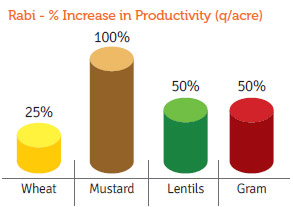
- Kharif: Productivity of maize and soya, major kharif crops, increased by 20% and 33% respectively. Yields of urad, cotton and groundnut increased to more than 50%.
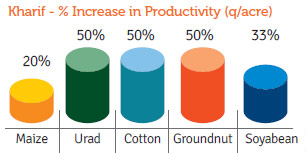
The study also found that changes in productivity were significant compared to the control plots, where productivity status was found to be almost similar to the situation that existed before the project was introduced in the villages.
| Activity | 2012-13 | 2013-14 | Cum to 2013-14 |
| Minor Irrigation | |||
| Group Irrigation (No) | 115 | 612 | |
| Sprinklers (No) | 34 | 385 | 1189 |
| Sustainable Agriculture | |||
| IPNM/Varietal Demo (No of plots) | 4,733 | 14,695 | 26,342 |
| IPNM/Varietal Demo (Area - Hectares) | 1,417 | 6,194 | 9,126 |
| Compost Units (Nos.) | 503 | 5,440 | 19,886 |
| Farmer Field Schools (Functional Nos.) | 162 | 284 | 284 |
| Farmer Field Students (Functional Nos.) | 5,129 | 5,562 | 5,562 |
| Agri Business Centres | |||
| No of ABCs (Functional Nos.) | 51 | 88 | 88 |
| Farmers Serviced (No) | 3,211 | 2,447 | 13,658 |
| Value of Inputs (Rs Lakh) | 86 | 213 | 367 |

Factory Catchments - Creating Social Capital
Habitats around industrial clusters are typically overcrowded and congested. Infrastructure is poor or creaking under the pressure of an increasing population base, drawn to such regions in the hope of gainful employment. Sanitation facilities are almost non-existent, creating unhygienic conditions which have a direct bearing on the high morbidity rates, especially among women, a distinctive trait in such settlements. The exposure to our factories is on two counts:
- A concentration of unemployed or under-employed youth with aspirations to work in our factories but who do not possess the necessary skills or qualifications to work in modern production facilities.
- Sharp disparities between lifestyles represent an ever-present threat of our operations getting disrupted.
The primary focus in the catchment of our factories is to create the necessary and enabling pre-conditions for future growth and prosperity of households living below the poverty line. A few of the fundamental causes for people feeling disempowered and apathetic towards their future are lack of employment opportunities. These are aggravated by illiteracy and ill-health, which prevent them from seizing opportunities that the labour market offers because they are either unqualified or energy-deficient.
Women's Empowerment
PROGRAMME DESIGN
ITC's Women's Economic Empowerment programme mobilises poor women to form micro-credit Self Help Groups (SHGs). Members make compulsory monthly contributions to create an initial corpus which is built upon with seed money from ITC. They receive training on managing funds and handling bank accounts to enable them to take their own financial decisions. Once the SHGs mature, financing loans for income generation activities are given to members, either from their own corpus or through banks.
Agarbatti Production and Sales
| 2011-12 | 2012-13 | 2013-14 | |
| Raw Agarbatti | |||
| Production (MT) | 336 | 834 | 1445 |
| Sales (Rs. Lakhs) | 177 | 355 | 855 |
| Women Members | 2299 | 3292 | 3714 |
| Scenting Unit | |||
| Dispatch (Mln. Sticks) | 294 | 367 | 319 |
| Sales (Rs. Lakhs) | 314 | 445 | 417 |
| Women Members | 42 | 48 | 89 |
PERFORMANCE
Commencing in 2000, the programme currently supports 1,682 operational SHGs with 20,230 members and cumulative savings of Rs.3.52 crores. 31,034 women are self-employed, while 7,731 women are employed in micro enterprises.
Agarbatti production was given a fillip during the year with the introduction of pedal machines, which increased output and, therefore, incomes for women. 1,368 pedal machines were operational in the states of Bihar, Uttar Pradesh, Tamil Nadu, Andhra Pradesh, Madhya Pradesh and Maharashtra to create livelihoods for women in rural areas. Production of raw agarbattis was 1,445 tonnes during the year. The women owned and managed scenting units dispatched a total of 319 million sticks with a turnover of Rs.4.17 crores.
IMPACT
The impact assessment of the women-led micro-enterprise programme in Munger (Bihar), launched in 2004, was conducted by SHAPE. The study findings give evidence of a profound shift in the status of women in these villages:
- From homemakers to earners of independent supplementary income - 74% of the respondents who had been solely homemakers, with no independent income of their own, now cite agarbatti rolling as their chief source of income. Of those who were previously earning incomes, most were engaged in agricultural labour (6.7%) or sewing (4.5%). Virtually all these respondents continue to pursue these activities along with agarbatti rolling which provides a convenient means to augment their incomes
- Expenditure pattern by virtue of income from rolling – 87% of respondents stated that extra income from agarbatti rolling helped in meeting day-to-day household expenses, while 53% cite school fees as their major expenditure, 55% spend on festivals and family occasions and 24% were able to spend on house infrastructure.
- Better positioned for Savings & Loan Repayment - The impact was seen to be more significant in the case of pedal rollers. About 33% of pedal roller respondents invested some of their income in savings, compared to only 9% of hand roller respondents. Similarly, about 31% of pedal roller respondents reported that they found it easier to pay back loans and borrow less (both in terms of amount and frequency) in contrast to 4.5% of hand roller respondents.
Primary Education, Vocational Training and Health & Sanitation
Primary education is one of the major indicators for raising overall cognitive development in a child and has a direct correlation with the country's Human Development Indices (HDI). It is equally important to upgrade skills of youth to better compete with the emerging needs in the job market.
ITC's primary education programme provides furniture, books, teaching aids and structural additions e.g. classrooms and toilets as infrastructural assistance to Government primary schools in the vicinity of its operating units. Supplementary Learning Centres (SLCs) set up by the programme provide additional coaching to help children keep up in school. Educated unemployed or college-going local youth are trained and employed as tutors in the SLCs which are situated in premises provided by the community. The programme also supports a network of libraries and resource centres and builds parental and community involvement in education through regular interactions and meetings. An initiative called Read India Plus Programme was introduced in the latter part of the year that aimed at improving education levels of children in and around ITC's production units. 30,000 new students were covered through all these above initiatives during the year, taking the total number of children covered till date to 3.36 lakhs. Infrastructure support was provided to 47 government primary schools during the year, taking the total number to over 1,011.
More than 2,400 youths were covered this year by the skill development initiatives, of which 38% belonged to the SC/ST communities, thus contributing to the Company's affirmative action commitment.
In order to promote hygienic environment through prevention of open defecation and to reduce incidence of water-borne diseases, 829 low-cost sanitary latrines were constructed for poor households on a cost sharing basis, around the factory locations of Andhra Pradesh, Bihar, Tamil Nadu and Karnataka.
Conclusion
 For India to progress on a path of sustainable and inclusive growth, and secure long-term economic competitiveness, ITC believes that it is imperative that the private sector plays a more proactive role in the social sector. Anchored in community based self-help initiatives, the ultimate aim of ITC's programmes is to build self-reliant, empowered local institutions that can catalyse change at the grassroots and develop leadership within stakeholder communities. ITC's CSR programmes are working towards this objective by building competencies at the local level – managerial, administrative and financial capabilities – that will eventually make the roles of external funding and implementation agencies redundant. The aim is to give communities control over their own resources and enable them to participate in the formulation and implementation of development strategies.
For India to progress on a path of sustainable and inclusive growth, and secure long-term economic competitiveness, ITC believes that it is imperative that the private sector plays a more proactive role in the social sector. Anchored in community based self-help initiatives, the ultimate aim of ITC's programmes is to build self-reliant, empowered local institutions that can catalyse change at the grassroots and develop leadership within stakeholder communities. ITC's CSR programmes are working towards this objective by building competencies at the local level – managerial, administrative and financial capabilities – that will eventually make the roles of external funding and implementation agencies redundant. The aim is to give communities control over their own resources and enable them to participate in the formulation and implementation of development strategies.
| Activity | 2012-13 | 2013-14 | Cum to 2013-14 |
| Primary Education | |||
| Govt Schools Infra Support | 46 | 47 | 1,011 |
| Children Covered (Lakhs) | 0.40 | 0.30 | 3.36 |
| Vocational Training | |||
| No. of Students (New) | 627 | 2,443 | 6,315 |
| Placements (No of Students) | 681 | 279 | 1,197 |
| Health & Sanitation | |||
| Sanitary Toilets (No) | 352 | 829 | 4,676 |
| Health Awareness Camps (No) | 63 | 30 | 445 |
The Road Ahead
Going forward, in a continuing affirmation of our commitment to sustainable and inclusive growth, we have set the following targets for the next 3 years:
SOCIAL FORESTRY
In our endeavour to provide fuelwood and fodder security to small and marginal farmers, the area to be brought under Social and Farm Forestry in Andhra Pradesh and Karnataka will increase by an additional 70,000 hectares, taking the total area to 2.30 lakh hectares.
WATERSHED DEVELOPMENT
Our commitment of improving the soil moisture regime of farmers operating in the rainfed regions of the country will find expression in watershed development of 1.30 lakh hectares, taking the total to more than 2.80 lakh hectares. To provide critical irrigation to these farmers, 3,000 new water-harvesting structures will be constructed, taking the total to 8,000 leading to a total freshwater storage of 29 million cubic metres.
SUSTAINABLE AGRICULTURE
To ensure higher yields on a sustainable basis and lower costs of production, sustainable agricultural practices will be significantly ramped up from the current 9,000 hectares to more than 50,000 hectares.
ANIMAL HUSBANDRY DEVELOPMENT
In order to hedge risks of farmers, we will continue to improve the performance of the livestock sector in our project villages by providing integrated services to 4 lakh additional milch animals, taking the total number of animals covered to 14 lakhs. More than 35,000 farmers will benefit through higher realisations for their milk through state-of-art milk procurement network and transparent measurement systems.
WOMEN'S ECONOMIC EMPOWERMENT
The Company's women's empowerment programme will continue to find avenues for gainful employment or supplementary incomes for 3,000 poor women from our project areas, taking the total coverage to 45,000.
EDUCATION & SKILLS
We will continue to improve the learning levels of primary school goers by reaching out to 25,000 additional children, taking the total to 3.60 lakh children. Acknowledging the urgency of creating a large pool of skilled human resources, the vocational training programme will be ramped up significantly to cover 36,000 additional youth, taking the total to 43,000 youth.
CREATING ENDURING INSTITUTIONS
CII-ITC Centre of Excellence for Sustainable Development
The CII-ITC Centre of Excellence for Sustainable Development is a co-creation of the apex national Chamber, the Confederation of Indian Industry, and ITC. With its abiding objective of promoting sustainability amongst corporates, the Centre is engaged in a wide spectrum of value-added and targeted initiatives that create awareness, provide thought leadership, build capacity amongst Indian enterprises and reward exemplary performances.
During the year, the Centre has made a meaningful contribution in drafting rules for Section 135 of the Companies Act 2013. The Centre was also awarded a four-year EU Switch Asia project titled 'Green Retail India' to promote sustainable development of India's food and beverage retail sector. The Centre has also partnered with the International Integrated Reporting Council (IIRC) to promote Integrated Reporting (IR) in India. The Centre will further constitute an IR business network in the country to provide Indian business ownership in the development and implementation of the IR framework. Based on a request from The Ministry of Environment & Forests (MoEF) the Centre is hosting the India Business and Biodiversity Initiative (IBBI) platform. This national level initiative will represent India's business sector at the UN Global Business and Biodiversity Initiative. Over the last year, the Centre also published several case studies and research papers on Sustainability and CSR.
The Centre also instituted the world's first corporate sustainability label, "Sustainable Plus", that provides a brand identity tool for companies to communicate that they are sustainable, responsible and well-governed. The Centre's 31 open programmes and 40 in-company programmes on a gamut of areas including Value Innovation, Sustainability Reporting, Stakeholder Engagement, Social Return on Investment (SRoI), Supply Chain, and Corporate Sustainability Performance management, conducted both in India and abroad, reached out to over 2,700 participants.
The 8th Annual Sustainability Solutions Summit continued its legacy of bringing together thought-and-action leaders from across the globe to discuss and propagate innovative and actionable solutions towards building a more sustainable future. The Centre also recognises and rewards the most significant contributions to sustainable development in the country through the CII-ITC Sustainability Awards.
The Centre is today playing a major role in engaging with policy makers to create an environment that encourages the adoption of sustainable business practices. The Centre is a consulting partner in several policy interventions such as Green Guidelines for Public Procurement, Low Carbon Expert Group of the Planning Commission, National Innovation Council, Ministry of Corporate Affairs on CSR Policy, National Awards for Prevention of Pollution, Rajiv Gandhi Environment Awards for Clean Technology and Technology and Finance Committee under the Montreal Protocol. It is also represented on the Board of the Central Pollution Control Board and other bodies.
ITC Sangeet Research Academy
The ITC Sangeet Research Academy (ITC-SRA) is a true embodiment of sustained corporate commitment to a priceless national heritage. It is a unique institution which has been at the forefront of disseminating the ancient tradition of Hindustani Classical Music. The Academy is also recognised for being the finest repository of Hindustani Classical Music. With a commitment that has remained consistent for over 37 years, ITC-SRA is the world's first and only professionally managed modern Gurukul, blending scientific research and technology methods with the purity of the age old Guru-Shishya tradition. While relentlessly focusing on Hindustani Classical Music, the Academy has also expanded its performance watershed to include the Carnatic genre as well as the rich heritage of folk music of Bengal. The Academy is currently engaged in carrying the message of Hindustani Classical Music across our country from the metros to rural India. Recent forays into neighbouring Bangladesh have brought home another dimension of the shared sub-continental heritage. The Academy also constantly endeavours to work together with other music organisations and institutions of repute.
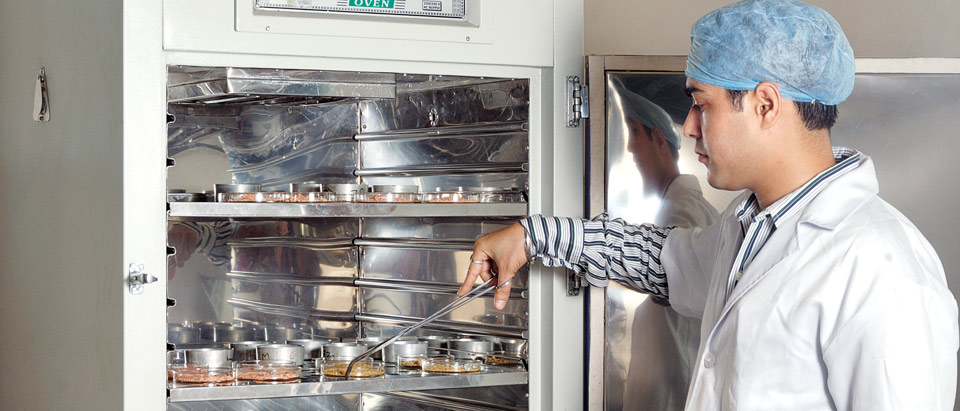
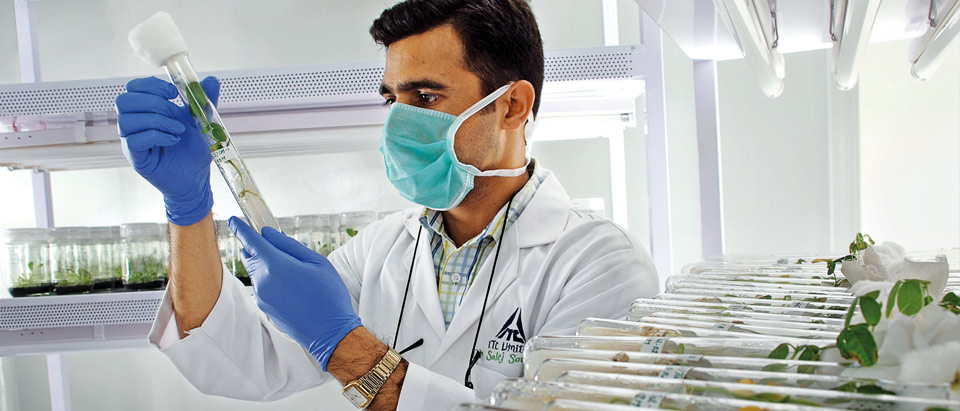
Management Approach
CUSTOMER HEALTH AND SAFETY
Given ITC's presence in the FMCG and Hospitality sectors, its products and services can have a direct impact on the health and safety of consumers and other stakeholders. The Company has accordingly established stringent processes and systems to ensure that all products and services are in total compliance with all regulatory requirements. In addition, product and service attributes are constantly evaluated to ensure progress towards compliance with best international standards and practices. This is an integral part of the Company's DNA and all efforts are made to ensure that there is no deviation on this account.
Our uncompromising commitment to ensuring compliance with relevant standards of health and safety commences at the design stage, wherein appropriate health and safety elements across manufacturing, delivery and consumption are identified and evaluated, and control measures implemented as and when necessary. New products are developed after careful consideration of global developments. This is supported by comprehensive research and testing facilities at the ITC Life Sciences & Technology Centre, whose laboratories conform to ISO/IEC 17025 and are certified by National Accreditation Board for Testing and Calibration (NABL). ITC uses proprietary software for regular monitoring and review of stringent raw materials specifications. Manufacturing units and hotels have state-of-the-art facilities, cutting edge technology and internationally benchmarked quality management systems, which are constantly reviewed and upgraded. For businesses that make use of third party manufacturing facilities, the quality performance of each manufacturer is monitored on a daily basis. The summary of systems and initiatives across some of our businesses is listed out in the following table:
| Business | Initiatives for improvement of health and safety impacts of products/ services |
| Agri - Business | The Business primarily engages in sourcing of agri-commodities like Wheat, Coffee, Potato, Shrimps, Soya and Processed Fruits. These commodities are sourced and supplied based on customer requirements of quality, quantity and packaging. Hence, there is no direct assessment of the health and safety aspects of the product. However, stringent process control and quality inspection norms have been established to ensure the quality of all products. All items are stored according to specifications in warehouses, which are selected based on prescribed norms. Systems and processes are in place to ensure the hygiene of the stored stocks. Products are shipped after meticulous testing either in-house, or at accredited labs or agencies, if required by customers. For processed fruit products that cater to specific customer segments, the Business has received the following international certifications for its organic and sustainable farm practices processed fruits business to cater to specific customer segments: Fairtrade certification endorsing that its products meet certain environmental, labour, and developmental standards Demeter Certification for Biodynamic Farming, a holistic method of agriculture USDA Organic Certification for Organic Farming Bio-Suisse Certification for Organic Farming |
| Foods | 52 out of 63 manufacturing locations, including third party manufacturing units, are Hazard Analysis and Critical Control Point (HACCP)/ ISO 22000 certified, ensuring that products use the best quality ingredients and utilise the highest quality processes. The objective is to continuously provide consumers with products that not only "Taste Good" but also "Do Good". Consequently, large investments are made towards R&D on products to deliver relevant functionalities based upon specific formulations for specific health needs, like reducing salt, sugar and oil across all products. These processes will start showing results over the next few years. Recently launched products like 'Sunfeast Oats Marie' and the newly launched 'Sunfeast Farmlite' attempt to seamlessly integrate healthy ingredients like oats and fibre into consumer snacking preferences. |
| Cigarettes | The Business uses proprietary software to regularly monitor and review stringent product specifications of all raw materials. With consistent focus on product innovation, new product development in the Business involves consideration of global developments and is supported by comprehensive research and testing facilities at the ITC Life Sciences & Technology Centre, where laboratories conform to ISO/IEC 17025 standards and are certified by NABL. |
| Leaf Tobacco | Product hygiene standards in tobacco cultivation are accorded the highest importance. Accordingly, awareness among tobacco farmers on the importance of producing sustainable quality tobacco with residue free product is constantly reinforced during field-level trainings and seminars in ITC's operating region. For frequent assessment on product integrity, farm-level and packed-level toxicant audit studies are undertaken wherein all leaf samples from farmlands and packed cases of finished products are closely monitored for toxicant residues. Several additional measures were implemented across the value chain during the year towards minimisation of Non Tobacco Related Matter (NTRM). |
| Personal Care Products | The Business follows a comprehensive approach for improving the health and safety impacts of its products in each of the following life cycle stages: Research and development All safety tests from prototype development to final product are conducted in accordance with standard international guidelines Research and Development Ingredients used in products undergo rigorous analysis, based on existing scientific literature, for their toxicity and skin sensitisation prior to clearance for use in product development Certification Product safety and efficacy is certified through external accredited laboratories Manufacturing and production Products are manufactured under strict hygienic conditions and in an automated environment Documented Quality Management System, including procured material checks, in-process checks and finished goods quality checks, ensures that the manufactured products are consistent and of high quality. |
| Hotels | ITC Maurya, ITC Mughal, ITC Maratha, ITC Grand Central, ITC Sonar, IT Windsor, ITC Kakatiya, ITC Rajputana, Sheraton New Delhi and My Fortune Chennai have established food safety management systems certified as per HACCP/ ISO 22000. ITC Hotels R&D endeavours to adhere to GHP & GMP (Good Hygiene Practices & Good Manufacturing Practices) along with the ISO 22000 food safety management system. The Hotels Business also conforms to relevant applications of PAS 220 (Prerequisite programmes on food safety for food manufacturing). In addition, to ensure the life safety of all customers, ITC has elaborate fire safety guidelines which have to be complied with by all Hotels. These guidelines are based upon National Fire Protection Association (NFPA) Codes and other international best practices. They supplement the general EHS Guidelines applicable to all ITC's businesses, the compliance to which is audited by the Corporate EHS Department on a regular basis. |
| Education and Stationery Products | The Business uses only approved non-hazardous materials, like ECF (Elemental Chlorine Free) paper, ink, dyes etc. Since the primary consumers of these products are children, stringent processes and quality control measures are in place to ensure that their safety is not compromised in any manner. |
| Lifestyle Retailing | All raw materials and garments are tested at the in-house laboratory for post usage experience and conformance to quality standards. The standards and product specifications are periodically validated by international testing agencies. Quality is monitored through an internal Product Quality Rating System (PQRS) together with the external Acceptable Quality Level (AQL) norm that is followed internationally by apparel businesses. The Wills Lifestyle brand has received the "Oeko-Tex" certification (w.e.f. January 2012), becoming the first brand in the domestic apparel retail segment in India to obtain such a recognition. The certification has been conferred by Hohenstein Textile Testing Institute GmbH & Co. KG, Germany. It guarantees that the products are free from more than 100 substances that are potentially dangerous to human life and ensures that Wills Lifestyle garments are completely safe for consumers, while at the same time maintaining a relevant style quotient in its products. |
| Packaging and Printing | Various initiatives have been undertaken in developing packaging solutions that use environment friendly raw materials such as water-based varnishes and reduction in material usage in terms of mass and thickness reduction in products. The Business engages with customers on a continuous basis to provide solutions that help protect functional needs like product integrity and visual imagery, whilst providing scope for use of alternate materials. The bulk of board packaging is already being done with non-toluene based inks. In the area of flexibles packaging, joint projects with customers have been undertaken to promote biodegradable flexibles packaging and printing with non-toluene and non-ketone based inks. In order to strengthen the health & safety requirement of products, all operations at the Haridwar factory and flexibles operations at the Tiruvottiyur Unit have been certified as per British Retail Consortium (BRC) Global Standard for Packaging and Packaging Materials. |
| Paperboards and Specialty Papers | ITC has been the pioneer in manufacturing Elemental Chlorine Free (ECF) pulp in India. This ensures that the levels of dioxins and furans in the pulp are less than 1 PPT (Parts Per Trillion). The global migration test is conducted periodically on all food-grade paper and paperboards for compliance with the US FDA standards and to adhere to prescribed limits for presence of heavy metals. All manufacturing ingredients are procured from reputed suppliers and conform to US FDA and equivalent standards. The Business ensures that the components of food allergens listed in the EC directive 2003/89/ EC and the US FDA Act are not used in any virgin grade boards and papers. The Bollaram Unit, which manufactures food grade board for direct food contact, is 'third party' certified in accordance with BRC/IoP (British Retail Consortium/Institute of Packaging) standards. Smithers Pira, a renowned testing and consultancy firm, certifies ITC's 'Indobarr' and 'Cyber Propac' brands to be compliant with German BFR standards for Food Packaging. |
| Matches and Agarbatti | Chemicals approved by IFRA (International Fragrance Resource Association, Geneva) are used to prepare fragrances, which are required in the manufacture of dipped Mangaldeep agarbattis. The manufacturing processes of the Matches and Agarbatti Business are designed to ensure product safety and consistency. |

Product Information and Labelling
As an organisation which makes comprehensive efforts to ensure legitimacy, transparency and good governance, ITC's business operations strive to comply with every relevant law of the nation. Systems have been put in place to ensure compliance before the launch of any new category or product.
Regular customer feedback system forms an integral part of B2C businesses, like Hotels, Information Technology, Cigarettes as well as other FMCG businesses, where there is direct interface with customers. Represented below is the customer satisfaction survey followed by ITC's Hotels Business.
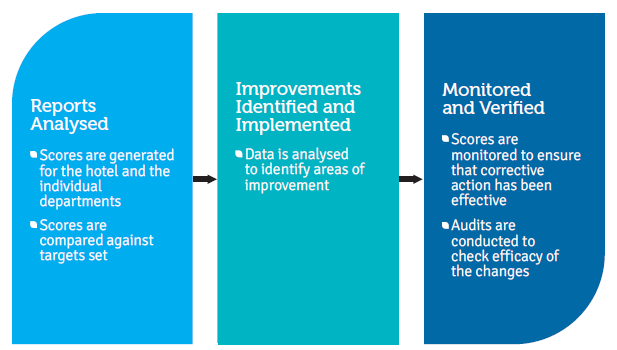
In the case of FMCG products, consumers are provided several communication channels like email, telephone number, website address and feedback forms to enable them to contact the relevant business. Processes are laid down to ensure that consumers are provided with responses on their feedback in a timely manner. In the Information Technology Business also, there are formal mechanisms in place to measure customer experience. The Customer Service Satisfaction Survey is an annual check on the robustness of the engagement, culminating in a Customer Experience Index. The survey is conducted amongst Chief Executives and Senior Management, and is based on a structured questionnaire customised for the recipient. Multiple parameters and business outcomes are measured including satisfaction, loyalty, advocacy and value for money. The outcomes and insights from the survey drive customer engagement and service delivery improvement initiatives at the organisation, geography, business unit and account level.
On the other hand, customer feedback for B2B businesses like Agri Business and Packaging and Printing, is obtained through different activities. For example, Agri Business has pre-season engagement with customers, client visits and engagement of the Divisional Management Committees with major customers. Given the nature of the business, claims due to rejections on account of quality are a valuable indicator of customer dissatisfaction. During the year under review, no such claims were made to the Business.
Marketing Communications
All Businesses/Divisions of ITC have established rigorous systems, procedures and review mechanisms to identify and comply with the laws and regulations concerning marketing communications. In addition, ITC has put in place a dedicated consumer response cell in order to answer any queries on the product.
ITC follows standard operating procedures to ensure that its marketing communications are in accordance with voluntary codes adopted by each business and the applicable statutes. These are vetted by the internal legal team and compliance is ensured by the internal audit department.
Marketing and Advertising Communications of all ITC's businesses are subjected to stringent internal checks by the Legal Department. The Company's consumer goods businesses adhere to voluntary and legal codes of conduct and follow the ASCI (Advertising Standards Council of India) Code for all marketing communications. During the year, a marketing communication on a new product category was reworked based on the direction received from ASCI.
Marketing communications for ITC's Hotels Business is governed by self-regulation and guided by the Indian Society of Advertisers (ISA) rules and guidelines.

Customer Privacy
Maintenance of customer privacy is relevant primarily for ITC's Information Technology and Hotels Businesses, both of which have well established systems and procedures for ensuring zero non-compliance. Network Architecture and Information Security controls are driven by industry best practices. The Business has drafted a privacy policy in line with the IT Act, 2000, that covers all aspects of data privacy with respect to sensitive information. The Business has also formulated an Information Management policy, which caters to the IT security aspects of the ISO 27001 ISMS framework. The IT operations arm of ITC Infotech Limited is ISO 27001 certified for its business processes to deliver IT services and projects. Documented procedures are available and practised to grant physical access to information, e.g. the defined and restricted access rights to IT Room/Server Room and User Access Management based on ISO 27001 and as agreed with customers. The Business has also put in place measures at various control areas in order to meet customers' requirements for data security. These include desktop access, server access, network access, operating system, application security, data transfer, penetration testing, etc. Clear guidelines are provided for data backup, retention periods, the media on which backups have to be maintained and storage at remote location.
In addition, stringent risk assessments are carried out to identify vulnerabilities and threats to assets and the controls that need to be put in place.
Performance
ITC's Hotels and Information Technology Businesses received no complaints regarding breach of customer privacy or loss of customer data in 2013-14. For the year 2013-14, the average WoW Ratio (Guest Satisfaction Index) for the Hotels Business was 91.70%.
Compliance
All Businesses/Divisions of ITC have well established systems, procedures and review mechanisms to identify and comply with the laws and regulations concerning its products and services. Particular care is accorded to tobacco products, taking into account the regulatory framework as well as social expectations of responsible tobacco usage.
ITC has established systems wherein every Business and Corporate Department has to submit a periodic statutory compliance report to the CMC/Board on all business regulatory, product specific, finance/revenue related, personnel related, technical/process related and environment related statutes and other applicable laws and regulations applicable. This is done on the basis of updated checklists that have to be mandatorily maintained by each reporting Unit/Business/function as well as monitoring and controlling systems that the Business/Corporate function must have in place.
As per this system, there were no incidents of non-compliance reported during 2013-14.
The Road Ahead
In order to further improve the health and safety impacts of products, the Foods Business is working on ways to progressively introduce biodegradable/recyclable packaging solutions. Such solutions will be developed to ensure that they do not compromise with product integrity, while addressing the issues related to packaging materials that are dictated by the unique characteristics of India in terms of both climatic and logistical conditions. Specific programmes have also been initiated by ITC's Packaging and Printing Business for environment friendly products such as using low migration inks for direct food packaging and moving from recycled to virgin boards wherever there is direct contact with food.

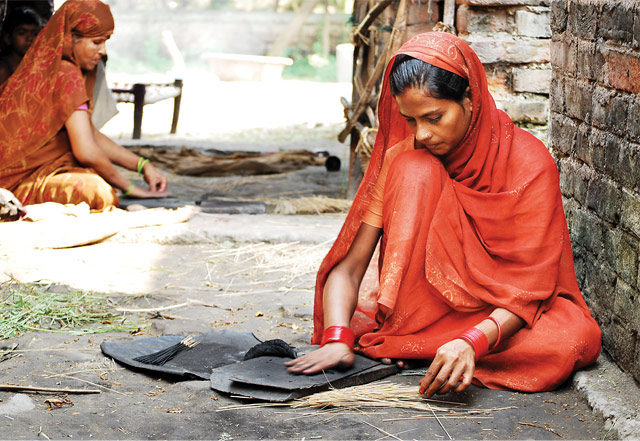

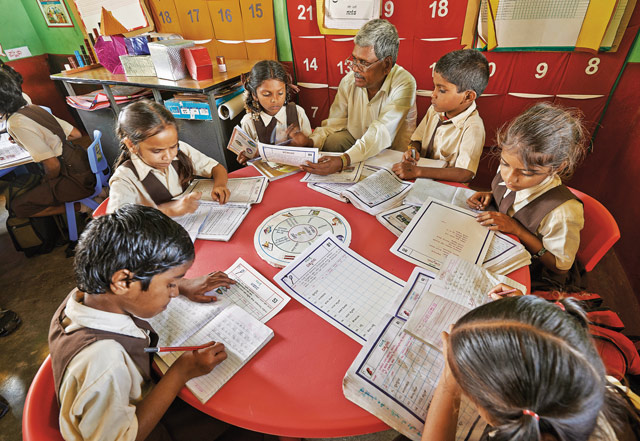
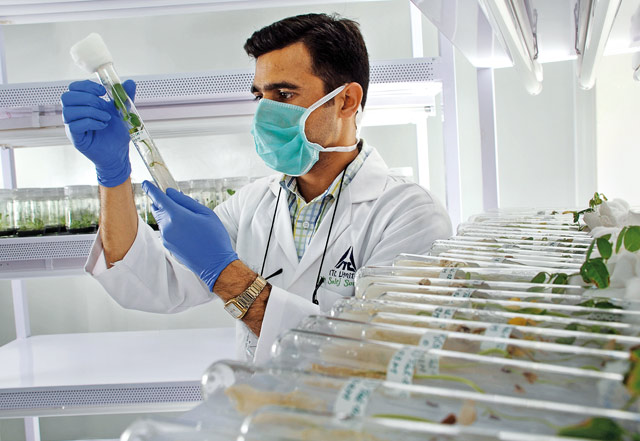
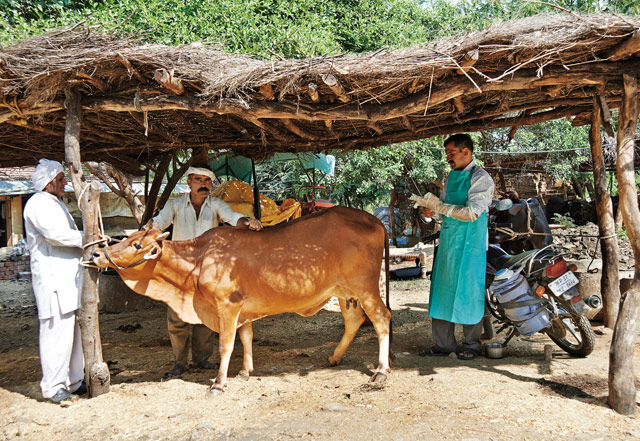
 In order to sustain its position as one of India's most valuable corporations, ITC has relentlessly pursued a strategy of being customer-focused, competition-differentiated, performance-driven and future-capable. The Company's Human Resource Development strategy seeks to fulfill this mandate through careful selection and rigorous implementation of a wide range of programmes and interventions.
In order to sustain its position as one of India's most valuable corporations, ITC has relentlessly pursued a strategy of being customer-focused, competition-differentiated, performance-driven and future-capable. The Company's Human Resource Development strategy seeks to fulfill this mandate through careful selection and rigorous implementation of a wide range of programmes and interventions. 